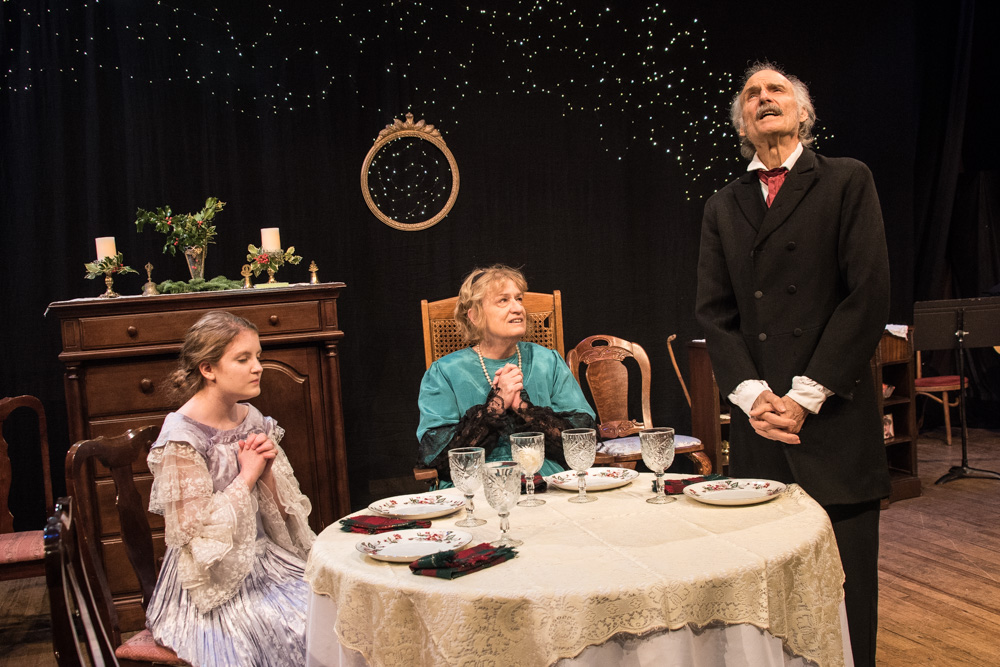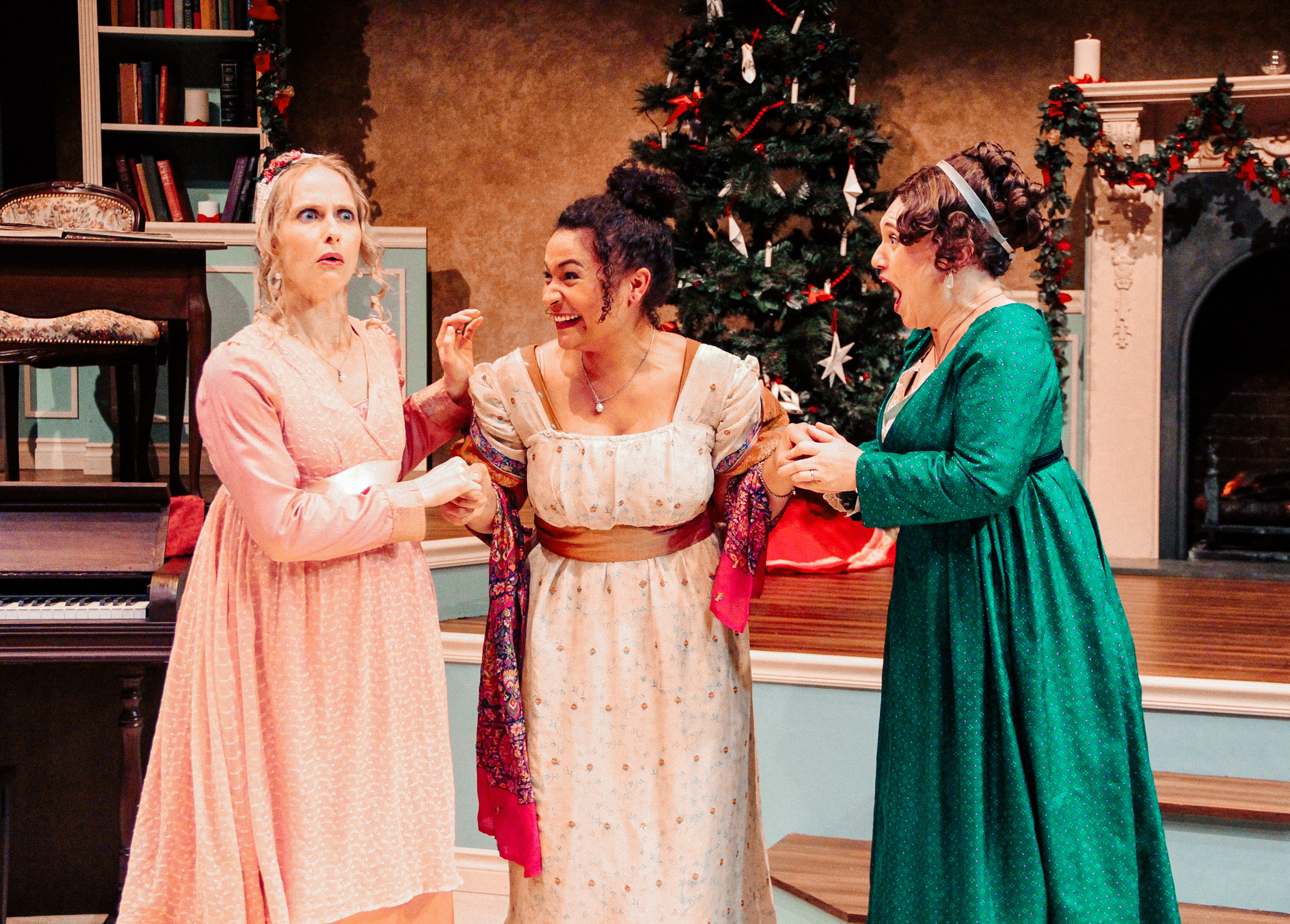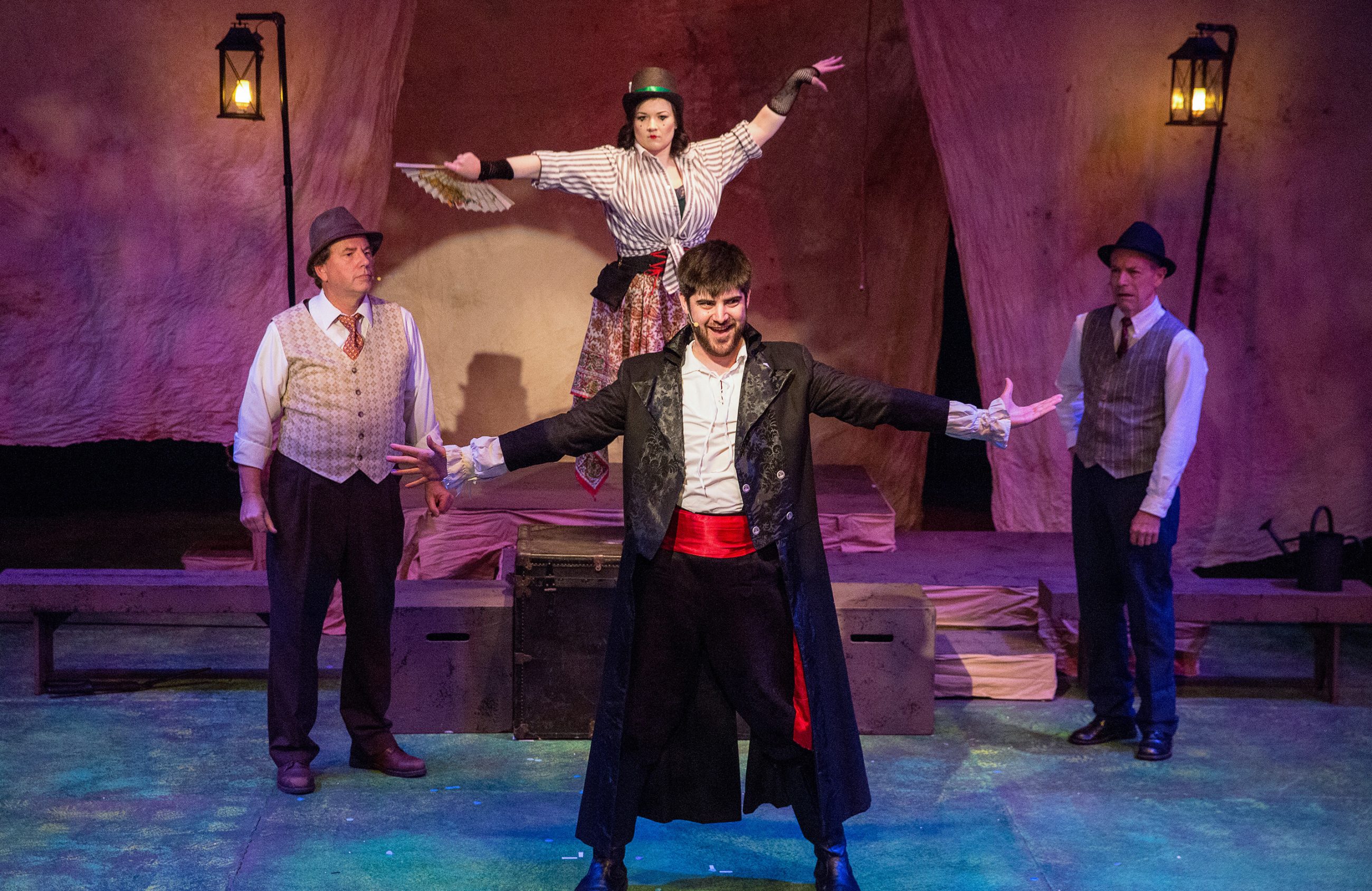The sheer intimacy and immediacy of theater lends itself splendidly to the holidays. It’s as though, facing the stage, we are basking as one in the familiar but ever-changing crackle of the Yule log. It might sound corny, but an act of communion — a sense of fellowship and collective dreaming — occurs in a theater audience that will never be replicated by your umpteenth viewing of It’s a Wonderful Life.
Theater does precisely what the holiday season was always meant to do: Bring us out of our solitary winter hidey-holes and bind us in the enactment of a cultural ritual, to tell us something of who we are. Even if the holidays aren’t religious for you, they hold an inescapable spiritual aspect. And live art — music, dance, theater — speaks most clearly to the spirit of the holidays.
Every year our local theaters bring forth their holiday productions, and they prove as various — and variously traditional or non-traditional — as the ornaments on the tree. Here are this season’s offerings (with a nod as well to Actors Cabaret’s current production of The Wizard of Oz, reviewed in EW on Nov. 21 and playing through Dec. 15).
The Fantasticks
At Cottage Theatre through Dec. 16
Unlike a lot of musical theater, The Fantasticks doesn’t offer a lot of razzle-dazzle.
Instead, it’s a small-cast, understated masterpiece, with an enormous beating heart and acute perception of the human condition. Written by Tom Jones and Harvey Schmidt, it opened in 1960 and closed in ’92 after more than 17,000 performances.
In the play, two fathers, Bellamy and Hucklebee, concoct a plot to get their son and daughter together. The best way to get your children to do anything, they reason, is to tell them not to. In Cottage Theatre’s production, the dads are played with fraternal energy by Mark Allen and Larry Brown.
Naturally, the plotting patriarchs build a wall dividing their gardens in order to keep their children, Luisa and Matt, apart. Which, of course, only makes the budding romance blossom. Luisa, played by Ashlee Winkler, is 16 and drunk on adolescence. Matt, played by Thomas Guastavino, is 20 and slightly more worldly wise. He’s been to college and believes he knows what his heart wants. And what his heart wants is Luisa.
To bring their ruse to conclusion, Bellamy and Hucklebee hire a band of actors, led by El Gallo, played with swashbuckling aplomb by Sam Anderson. The rogues are to stage an abduction of Luisa. With Matt saving the day, Bellamy and Hucklebee can call off the charade, appear to make amends, and everyone will live happily ever after.
Of course, it doesn’t quite all go according to plan.
CT’s entire cast is excellent. The singing is strong, and the stripped-down, piano-based score is a veritable Lazy Susan of memorable melodies. Winkler and Guastavino are radiant. And in small roles as part of El Gallo’s troupe of thespian skallywags, Henry and Mortimer, played by Dale Flynn and Keith Kessler, nearly steal the show. The production is ably directed by Kory Weimer.
The Fantasticks is a play about make-believe and falling in love with love. It’s also about parenthood, growing up and the painful beauty of youth.
El Gallo sings in one of the play’s best-known pieces, “Try to remember when life was so tender that/ Love was an ember about to billow/ Try to remember and if you remember then follow.”
You will follow, and you won’t be sorry you did. — Will Kennedy
Enlarge

Photo courtesy VLT
The Long Christmas Dinner
At Very Little Theatre through Dec. 16
I have a lot of experience hearing and singing Christmas carols. I can — kind of — recite the German lyrics of “Silent Night” as a party trick, usually to an audience that is not nearly as impressed with my talent as I had hoped.
Still, even with what I considered to be a wealth of knowledge on the subject, I never knew there were quite so many verses to “The Holly and the Ivy,” something I am now aware of after seeing Very Little Theatre’s production of The Long Christmas Dinner.
A bit of exposition: Thornton Wilder’s play tells the story of 90 years at the Bayard family’s Christmas dinner table, family members coming and going as the years go on. For a play that is supposed to span almost a century, its typical runtime is fairly short — only about a half an hour.
Very Little Theatre’s production adds about an hour to that, with roughly 25 full-length Christmas carols, both spoken and sung, thrown into the mix.
The addition of these carols is often at odds with the story itself. An entire act of carols and poems is essentially added to the one-act play, giving it an odd flow — the story does not begin until about 45 minutes in. The incorporation is a nice, fun idea, but it is executed in a way that is slightly confusing.
Including every single verse to these carols may have been slightly excessive, though it allows every cast member to have a moment to shine, which is especially important for the role of the Nurse (Marcee Long), an otherwise non-speaking role. Long is one of the most pleasant performers in the production, and it is good to see the role beefed up for her.
Phoebe Gildea, playing Lucia II, also thrives in the opportunity to sing. A 14-piece live orchestra accompanies the singing and creates some sparkle as well.
The cast as a whole exhibits a contagious Christmas energy, and their happiness was a joy to witness. Elizabeth Grieve is lovely to watch in the role of the elder Lucia, though the age difference between Grieve and her onstage husband, Rodrick (Steve Mandell), requires a bit more than the typical suspension of disbelief to accept, even considering how times have changed since the 19th century.
Sarah Nesslin plays Genevieve, who adds a bit of zest and conflict to the otherwise fairly uneventful plot, and her enthusiasm is palpable.
Perhaps the cast of The Long Christmas Dinner would be better suited to a more modern and exciting Christmas play, possibly even a musical with songs more fully integrated into the story. However, VLT presents a touching message, successfully emulating the Christmas spirit.
The audience walks out of this production more thoughtful than they walked in, and I think that was what Thornton Wilder intended. — Taylor Griggs
Enlarge

Photo courtesy The Shedd
White Christmas
At The Shedd through Dec. 16
World War II nostalgia — think everything from Band of Brothers to The Sound of Music — may at last be on the wane as the Greatest Generation ages out. The death of former combat aviator George H.W. Bush reminds us that soon no one will be left standing who remembers Pearl Harbor or the Battle of the Bulge.
White Christmas, which opened at The Shedd Nov. 30, transcends its generational roots through exuberant Irving Berlin songs and a wonderfully sappy plot. Based on the hit 1954 movie of the same name, the 2004 stage adaptation wraps a conventional romantic comedy around a feel-good story of leadership and loyalty.
When the lights come up, it’s Christmas Eve 1944, and the beleaguered men of the 151st Division are enjoying a moment of holiday cheer amid Europe’s wartime chaos. Two song and dance men, Capt. Bob Wallace (Ward Fairbairn) and Cpl. Phil Davis (Eric Blanchard), are singing Berlin’s 1942 hit “White Christmas” when they’re gruffly interrupted by Gen. Henry Waverly (Matthew Leach), who chastises them, tongue in cheek, for being out of uniform, then notes, sadly, he’s heading back stateside for a medical retirement.
The next thing we know it’s 1954 in New York. Wallace and Davis, now a top act on the Ed Sullivan show, encounter an aspiring sister act, Betty Haynes (Lynnea Barry) and Judy Haynes (Cyra Conforth). Romantic scheming brings all four singers to rural Vermont, where they find that a cardigan-wearing Gen. Waverly owns a winter resort that’s about to succumb to bad weather and worse management.
All that’s needed to save the general and his inn is a Christmas performance by Wallace and Davis and a command reunion of the 151st.
The stage version of White Christmas has challenges. Who can compete with Bing Crosby and Danny Kaye? The show is not an integrated musical, with songs advancing the plot. Instead, it’s a back-stage musical revue closer to 42nd Street, with its manic Busby Berkeley energy, than to Oklahoma!
Never fear. That sheer manic humor blossoms here under direction by Ron Daum and smart choreography by Caitlin Christopher. Robert Ashens, as music director and conductor of the live orchestra, doesn’t miss a beat.
Fairbairn’s Capt. Wallace, with the good-natured, padded-shoulder presence of a Ronald Reagan, offers a straight man to Blanchard’s wily schemes, and Conforth and Barry make for a sweet sister act.
A dazzling turn near the show’s end comes from Sheldon High School freshman Johanna Gilbert, playing Waverly’s granddaughter Susan, when she launches into “Let Me Sing and I’m Happy.”
Buy yourself a present, and go enjoy some holiday warmth. — Bob Keefer
Enlarge

Miss Bennet: Christmas at Pemberley
Photo courtesy OCT
Miss Bennet: Christmas at Pemberley
At Oregon Contemporary Theatre through Dec. 16
It is a truth universally acknowledged that a theater audience desiring a romantic comedy of manners during the holiday season must be in want of some Jane Austen.
Written with verve and charm by Lauren Gunderson and Margot Melcon, Miss Bennet: Christmas at Pemberley is a stage adaptation that picks up a few years after the conclusion of simply everyone’s favorite novel, Pride and Prejudice.
Set during the holidays at the estate of the dreamy Darcy (Andrew Black) and his wife, the iconically indomitable Lizzie (Melanie Moser), the play focuses not on this perfectly matched couple but on the sole unmarried (and unmarriageable?) Bennet sister, the wry and bookish Mary, played to perfection by Sabrina Gross.
The story recapitulates Austen’s classic, though with some lovely twists on the themes of burgeoning romance and its potential thwarting due to class entanglements, failed communication and personal rivalries — in short, the trademark stuff of romantic comedy, which Austen all but invented. The playwrights are keen on upholding the high-brow humor and embattled politesse of Austen, while winking slyly to modern audiences, all without losing an ounce of the smart sexual politics that give the original such a timeless appeal.
Mary’s lonely but furiously self-contained existence receives an unexpected gust of turbulence with the arrival of Arthur (Joseph Workman), a bachelor who’s recently inherited an estate of considerable standing. Similarly nerdy, for lack of a better term, Arthur is intrigued by Mary, with whom he shares a fondness for scientific treatises and daydreams of world travel.
Their courtship is tentative, bashful and completely sweet. And, of course, it wouldn’t be a bit of Austen-inspired fun if it weren’t also complicated, largely by family ties and untoward obligations. At Pemberley, it takes a village to raise a romance: sister Jane (Erica Towe) and her husband Bingley (Matt Holland), expecting their first child; the unrepentant flirt Lydia (Janelle Rae), who focuses her heat on Arthur; and, of course, the devilish Anne (Lindsey Esch), who single-handedly decides she and Arthur are to be wed in order to preserve her share of the inheritance.
It’s all so much fun, with just the right combination of warmth, wit and sensuality. The cast is fantastic, and director Elizabeth Helman brings Austen’s world alive with economy, taste and a strong feel for those underlying tensions that can explode in moments of high-brow silliness or heartwarming woo. And never has a Christmas tree — inside a manor, no less! — been revealed for the exotic contrivance it is.
With so much crass commercialization dominating the yuletide, Oregon Contemporary Theatre’s production of Miss Bennet gives the holidays back to the holidays, by finding humanity in the heart of tradition and revealing the real relationships that can make this time of year a true joy. — Rick Levin
Don’t miss Eugene Weekly’s look at local children’s theater programs in our upcoming Dec. 20 issue.
